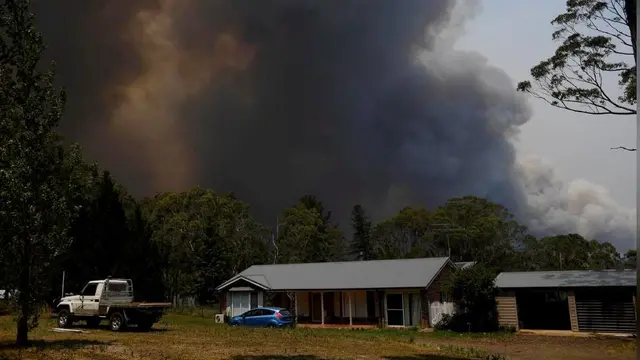Smoke from the Grose Valley Fire rises in the distance behind a home, at Bilpin, New South Wales, December 21, 2019. /Reuters Photo
Fire conditions eased on some of the major fronts burning across Australia on Sunday after a cool weather change, with firefighters trying to contain blazes before the expected return of hotter conditions at the end of the week.
Prime Minister Scott Morrison visited the Rural Fire Service (RFS) headquarters in Sydney, after cutting his holiday in Hawaii shortand returning on Saturday night. The holiday decision drew sharp criticism as the wildfire crisis in his home state worsened.
On Sunday he acknowledged taking his holiday had caused anxiety. "I get it that people would have been upset to know that I was holidaying with my family while their families were under great stress," he said.
The intensity of fires eased overnight in New South Wales, Victoria and South Australia states, where fires had been burning out of control on Friday and Saturday as a combination of extreme heat and strong winds created "catastrophic" conditions in some areas.
Flowers and the helmets of two volunteer firefighters, who lost their lives in fighting fires, seen placed at a memorial at the Horsley Park Rural Fire Brigade in Horsley Park, December 20, 2019. /Reuters Photo
More than 105 fires were still burning across New South Wales on Sunday, with 59 considered uncontained and one burning at an emergency level.
"Today is thankfully expected to be much cooler for large sections of NSW, which will be a welcome reprieve. However, many communities away from the coast will still experience significant heat," the Bureau of Meteorology tweeted.
Conditions are expected to remain favorable over the coming days as firefighters work to contain some of the flames near communities, particularly in the Blue Mountains region to the west of Sydney.
Australia has been fighting wildfires for months as hot, dry conditions created an early start to the fire season, with blazes destroying more than 700 homes and nearly three million acres (1.2 million hectares) of bushland.
(Reuters)
 简体中文
简体中文

